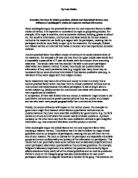The government introduced changed the way they issued child benefit, the money the government gives to families will now be paid to the mother directly. This has affected the family and households hugely; feminists would argue that this policy is there to instil the view and norm of society that women are responsible for child care and for the socialisation of the child. The feminists would argue that this job is not just for women to take care of but for the men to play their part as well. However some feminists would agree with this policy saying that men are not responsible and the women would spend the money better so they should have the money. Groups such as fathers for justice argue that the socialisation of the children is the job of both the mother and the father and that this should be recognised in the benefit system. The policy has the affect of promoting the traditional nuclear family where the father is the bread winner and the mother cares and raises the children, the new right agree with this policy because it that. Some would argue that this kind of policy is intervening in the family to stop it modernising and progressing into a family of more equality between the mother and father.
The divorce act of 1969 was seen by many people from functionalists and the new right as an attack on the traditional nuclear family. They argued that it would break up families and households and cause great pain to the children who had to suffer the trauma of the break up. They went on to argue it would also cause an increase in the number of single parent families which they argued were bad for society. The feminists agreed with the policy as it would liberate women to be free from oppressive men. This law did have the effect to change the shape of the family, there has been a huge increase in the number of single parent families, which has increased the number of households, and this has put huge strain on the housing market, which has resulted in a shortage of houses. It could be said that this policy changed the structure of families’ and households. Morgan (2000) argued that governments are ‘antimarriage’ and they actually encourage ‘deviant’ styles of family such as single parent families and homosexual families.
The new right were critical of the government policy to encourage mothers to go to work when labour introduced the new deal of 1998. They argue that this state policy will have the affect of damaging children because there is no mother there to look after them and socialise them. They argue that it has damaged children by causing maternal deprivation; this is where a child grows up deprived of maternal love. Valerie Riches, the founder of a organisation called family and youth concern, she argues that sending housewives out to work is bad for the family as it means that men’s “masculine role as the provider and father is being obliterated. However feminists welcomed this kind of policy as they believed it would go some way to ending the huge gap in equality between men and women. They argue that women should have the same chances of employment as men do.
The legalization of abortion and making the contraceptive pill free on the NHS in the 1960s was seen as an attack on the nuclear family by the new right. They argued that the new found sexual freedom for women would lessen their commitment to family life. The feminists were very happy as it created sexual freedom for women to decide when they became pregnant. This meant that for the first time women could concentrate on a career first and then have a family. This changed the way the family operates hugely, couples are now having children later in life and in quite a lot of cases not having children at all. This state policy meant that there were more households’ with no child.
As we can see from item C state policy regarding homosexuality has changed drastically in the last 100 years. Item C shows how the House of Lords ruled that a homosexual couple in a loving and stable relationship can be defined as a family. This meant that homosexual families could be treated like heterosexual families; it also went part of the way to making it acceptable to be homosexual. This was faced with some criticism from the new right who argue homosexuality is unnatural and deviant. As we can see in item C Dr Adrian Rogers argued that homosexual couples “cannot be defined as families – the basis of true love is the ability to procreate and have children.
When new labour came to power they recognised that the family is changing and adapted state policy to reflect that. They introduced policies which helped the family develop such as; increasing maternity leave from 14 weeks to nine months, doubled maternity pay, invested in subsides for nursery care and introduced the right for parents of young children to ask for flexible working hours. Lewis (2007) argued that all of these state policies were family friendly; they helped families be there to care for their children.
However perspectives such as the new right say that state intervention can be a bad thing for the family. They say it creates a nanny state which infringes the personal life of the family. Some would argue that state intervention has a negative effect on the family as it takes away the choice for the family in society to develop how it wants to develop and not how the state wishes the family and households to develop.







